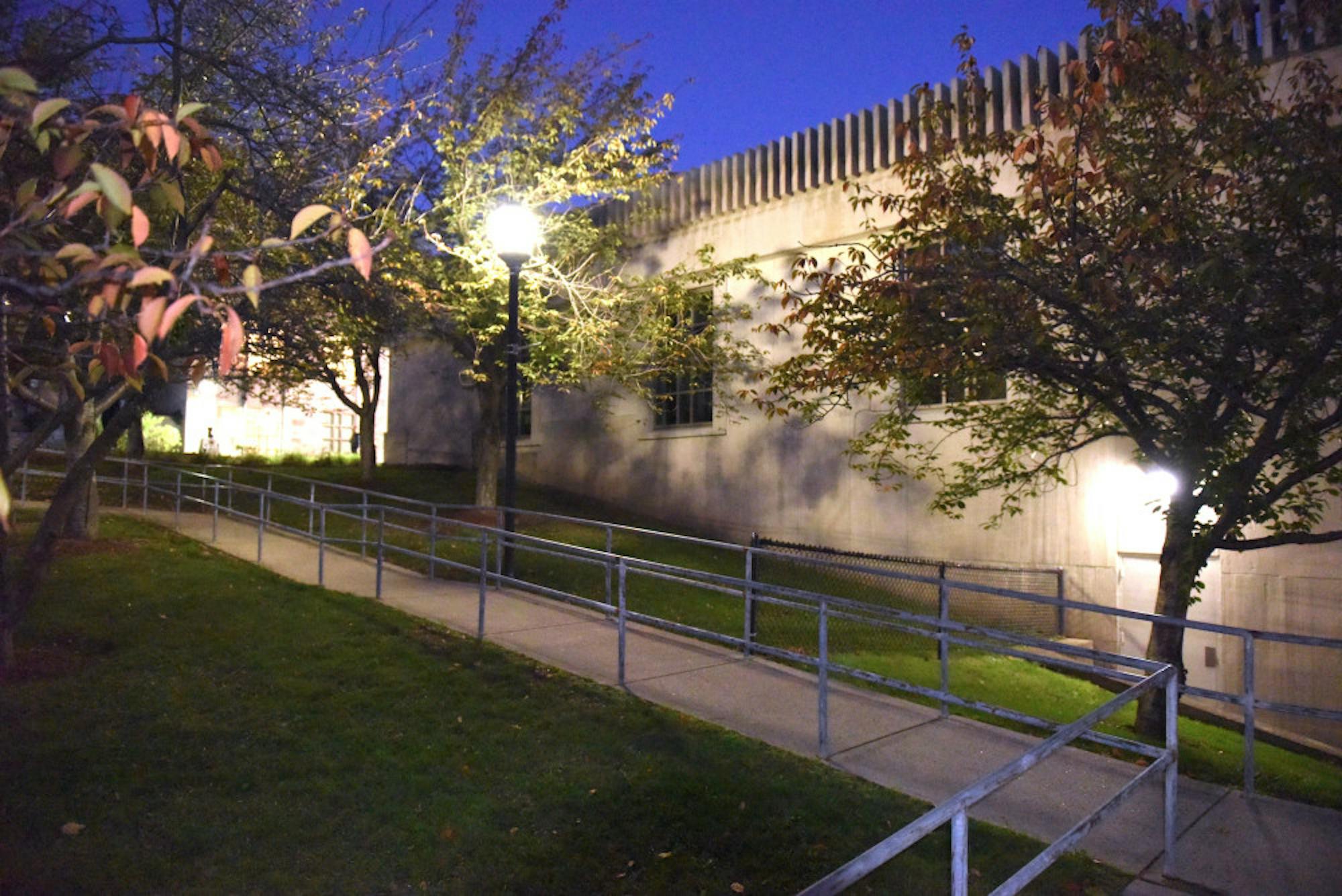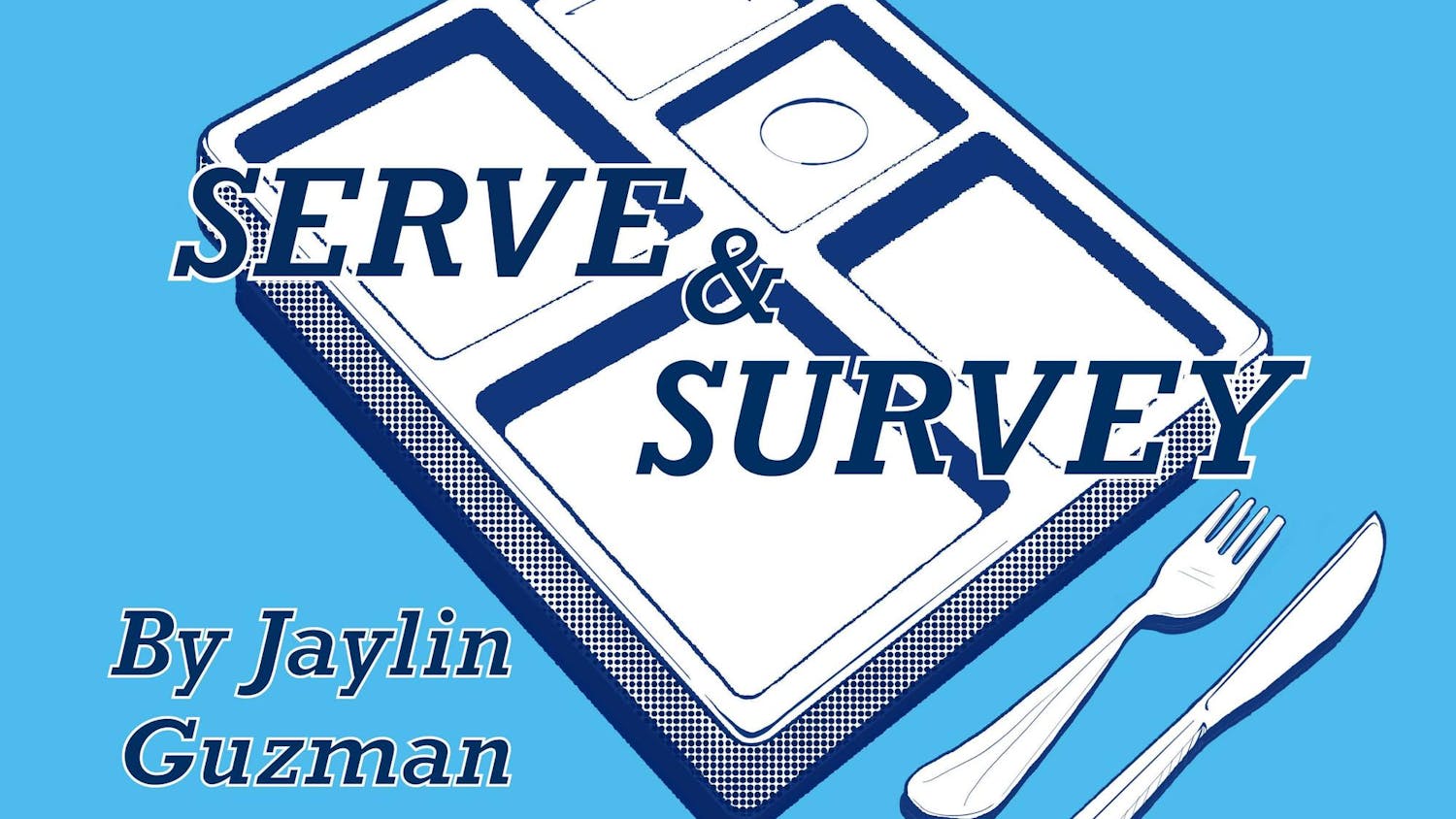The unforgiving incline that divides Tufts campus into uphill and downhill is a part of students’ everyday lives and most of the time it is something they grow used to. But for several members of the Tufts community who identify as being physically disabled or physically differently abled, the physical barriers of campus, as well as the physical demands of being a student, are things that they must think about every day.
According to an email from Kirsten Behling, director of Student Accessibility Services (SAS), to the Daily, Tufts refers to the Americans with Disabilities Act (ADA) as a basis for defining disability. The ADA defines disability as a “physical or mental impairment that substantially limits one or more major life activities."
Among the resources available to students on campus, Behling cites SAS as the main entity that assists students with physical disabilities. SAS supports undergraduate and graduate students by aiming to promote an accessible college experience for students with disabilities. Their services include note-takers, alternate formatting of course materials, reduced course load and a variety of other academic accommodations shown on theirservices webpage.
According to Behling, any student with a disability or any student who may not yet be diagnosed but believes they have a disability can register with SAS. Students are required to submit diagnostic documentation, after which they will meet with SAS staff to determine qualification for accommodation. She went on to explain that granted accommodations are good for one semester and must be updated to carry over into future semesters.
Senior Sidney Beecy found herself involved in this registration process this past summer when an ACL injury left her unable to walk for the first week of school, with additional difficulty traveling on and off-campus for the following weeks. Without adequate information on physical disability services on the SAS website, Beecy began an exchange with SAS Assistant Director Kimberly Doan. While Beecy hoped to receive a parking pass that would give her access to faculty/staff parking areas to travel between home and classes, she found it to be a much more difficult process than she imagined.
“They emailed me back and said that there was no way they could help me get to campus that first week,” Beecy said. “They also told me that the only way to get a parking pass was to purchase one.”
Beecy responded that this was financially not an option for her, as she would be out of work for several weeks to recover. A residential student parking pass costs $360 a semester for the Medford/Somerville campus, according to Tufts' administrative services website. She was then told by Doan that her best option was to take a leave of absence for the semester. Feeling as though she was being made to choose between recovery and her final fall semester at Tufts, Beecy reached out to the Dean of Student Affairs, Mary Pat McMahon, to express her frustration as advised by her major advisor. It was only then that she was granted a specialized parking pass, an additional and extremely taxing process that took several weeks of miscommunication between SAS and Tufts University Police Department (TUPD) to resolve; it was so emotionally draining that it brought her to tears.
“I’m in a privileged position because I’m only injured from a surgery for a few months. There’s currently no way on campus to get people around. If you’re living on this campus with an injury, there’s no way to get to class without physically moving on crutches. And it’s not [an] SAS issue, it’s an institutional issue,” Beecy said.
The confusion and frustration of Beecy’s experience extends to the experiences of several other Tufts students who have permanent physical disabilities. Although Senior Anjana Gupta was diagnosed with pelvic floor dysfunction, which has weakened the muscles in her hip and diaphragm area, she cites that she hadn’t had any accessibility services needs until this year.
“It was fine until this year because I never really had to walk up the hill because I lived off-campus, and I avoided the hill every day," she said. "This year, when I came back to classes, I realized that I couldn’t make it up the hill anymore. I had to stop and take a breath because my muscles just couldn’t take the push of having to walk uphill.”
While Gupta also required a parking pass that would allow her to travel to class by car, unlike Beecy, Gupta initially reached to Health Service to receive a doctor’s note. Gupta was denied the note on the grounds that she was not physically disabled enough.
After this exchange, Gupta reached out to Doan at SAS in search of other resources.
“[Doan] reached back to me really fast and set up a call with me. She said she couldn’t help me but she was nice, I wasn’t upset. So, I asked what I could do, and she said I could try getting a note from my doctor and have it sent to health services,” Gupta said.
According to Gupta, while SAS can help disabled underclassman students bring a car to campus, because Gupta is already an upperclassman, she had initially purchased a normal student parking pass. However, Gupta noted that the parking area behind Miller Hall that she has access to is still difficult for her to go to and from class in Lane Hall. She is currently working with her doctor and physical therapist to receive a handicapped parking pass to be able to park more freely.
Claire Pernat, who plans to graduate in 2020, unlike Gupta and Beecy, has additional experience in taking a leave of absence.
“SAS was actually the first group to label me as ‘disabled,'” Pernat said, who was diagnosed with a connective tissue disorder.
The disorder affects Pernat’s whole body, often very randomly she said, and leaves her unable to write or sometimes even move. Initially thought to be a temporary injury, Pernat said she was registered with SAS for temporary accommodations after a difficult series of communication.
“They were like, 'Send us a doctor’s note.' So, I immediately did,” Pernat said. “And then I didn’t hear from them, so I emailed them again. They said 'We need this other form,' so I immediately sent them that. This process kept up for several days.”
It wasn’t until Pernat’s mother intervened that Pernat was granted temporary accommodations. Even after she was granted access to services, Pernat found herself having to update her doctor’s notes every few weeks until she took medical leave to undergo surgery again. Taking medical leave was a choice that Pernat made but she says it is not one that she would make again.
“You have to submit a lot of stuff to come back from medical leave,” Pernat said. “I didn’t realize how lengthy that process was and if I had known before, I probably would have chosen to take personal leave. I had to talk about what had changed and prove why I could come back.”
After Pernat’s return from leave, her doctor submitted a letter confirming that she would be permanently diagnosed.
“After they got that letter from a doctor saying that this will never change, they’ve been really good,” Pernat said.
For students like Pernat and Gupta, who have less visible or invisible disabilities, the process of acquiring services can be made more difficult. According to an email from Doan, in such situations where a student's disability is non-visible, hard evidence serves as the most important point of qualification and explains the case-by-case basis of accommodations.
"Students’ requests for accommodations are reviewed on a case-by-case basis, as each student’s individual experience is unique," she wrote. "Since many disabilities are non-visible, the medical documentation submitted from a student’s clinical team is crucial in determining if the student qualifies as a student with a disability as well as which reasonable accommodations may be appropriate for their academic or residential experience."
Pernat found that, despite the medical evidence she provided, the nature of her disability and the accommodations she required made for an experience that was difficult to explain.
“A lot of people assume that I am able-bodied and that I can do a lot of things because I look like I can. I had to submit quite a bit of evidence that I was disabled,” Pernat said. “The thing that amazed me was that even when I had this huge brace on, [SAS was] apprehensive about it.”
Gupta, who initially worked with Health Service to accommodate her disability, spoke about experiencing similar issues.
“I understand that I’m not visibly disabled but it’s an invisible disability that’s hard to see,” she said. “I think people don’t understand disability as much when they’re this invisible.”
Between Beecy, Gupta and Pernat, there seemed to be an understanding that, while SAS was providing communication and options, there was a lack of structure, funding, informed decisions and often a lack of scope of power that allowed them to be as useful a resource for students with physical disabilities as they could be.
“They’re just very disorganized and there doesn’t seem to be a lot of financial understanding for people who can’t pay for the pass,” Beecy said. “It was almost like they had never had to deal with it or think about it. The first option shouldn’t have just been ‘Quit school.'”
Pernat spoke to the various changes that SAS could make from her experience with acquiring accommodations, taking leave and assimilating back to campus life.
“One, make the process a lot clearer before students take leave and even when they’re trying to come back, make it a very clear and transparent process. Because now, it’s not either. It’s very confusing. Two, with that, have a process that lets students know they can come back. For a long time, I didn’t know if I could come back," Pernat said. "Just streamlining that process, or having someone designated to working with specific cases instead of having five different people to contact would help. Additionally, support systems for students who are coming back from leave would also help."
Doan expressed that SAS is committed to working to support students with diverse needs while additionally hoping to inform students of their work in increasing visibility, developing educational opportunities and promoting universal design.
"We are steadfastly committed to providing students with the best support in and guidance possible and always remain open to feedback, and would encourage individuals with specific concerns to reach out to us directly," she wrote.
Having been through the process of seeking accommodations, Pernat recognizes the efforts of SAS but also hopes for further improvement.
“I know they’re trying, and I know that they’ve made changes,” Pernat said. “But there’s a lot they can still do.”
Arman Smigielski contributed reporting to this article.
Students with less visible disabilities struggle for accommodations

The pictured hanicap ramp/bike lane connects the downhill campus and Tisch Library, on Nov. 8.





